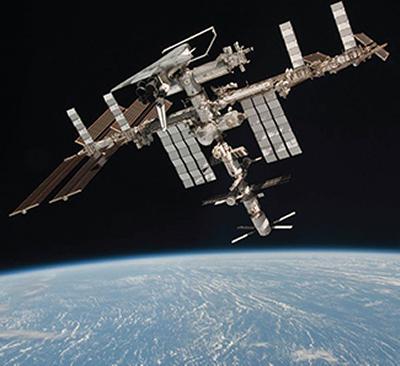Out of this world: Southampton research into the health impacts of human spaceflight

Pioneering research from the University of Southampton into the health impacts of spaceflight has been identified as a possible experiment to be conducted by British astronaut Tim Peake on his maiden voyage to the International Space Station (ISS) later this year.
In a recent international call for new life sciences experiments to be flown on the ISS, coordinated by NASA, the European Space Agency (ESA) and the Japanese and Canadian space agencies, three new experiments led by UK research teams were selected by ESA for further consideration. Of these, an experiment led by Professor Donna Davies from the University of Southampton was one of the two top-ranked proposals in Europe in terms of scientific merit, judged to be ‘outstanding’ by the international review panel.
Professor Davies is part of an international team who will investigate how a lack of gravity affects the respiratory system, using a novel 3D model of human airways. The aim of the experiments is to improve our understanding of human health here on Earth, as well as the effects of long duration human space travel.
Professor Davies said: “Cells can respond to mechanical signals such as gravity, pressure or touch. Although zero gravity conditions alter several aspects of lung structure and function, how this works at the cellular level is unknown. Our experiment aims to explore how weightlessness affects several aspects of airway cell behaviour including production of the protective mucous layer, formation of cilia (motile hair-like structures that move the mucous along the airways) and deposition of extracellular matrix (scar tissue). Since these processes are altered in several common, chronic lung diseases, we hope that our experiment will provide new insight into lung health and disease.”
The experiment by Professor Davies has been highlighted by the UK Space Agency in its National Strategy for Space Environments and Human Spaceflight, which was published this week - https://www.gov.uk/government/uploads/system/uploads/attachment_data/file/442462/Space_Environments_and_Human_Spaceflight_Strategyv2.pdf
The strategy is published ahead of British ESA astronaut Tim Peake’s maiden voyage, expected in December 2015. Tim will be the first British astronaut to visit the International Space Station (ISS) and during his six month mission will conduct a range of scientific experiments, which will increase knowledge, deliver benefits on Earth and test technologies for future missions further afield, such as to the Moon or Mars.
Minister for Universities and Science Jo Johnson said: “From new advances in healthcare to getting our young people really excited about science, human spaceflight has the potential to deliver a huge range of benefits here on Earth. This strategy outlines our ambition to advance scientific knowledge and create the right environment for human spaceflight and space environment research to boost growth and deliver new technologies that will improve everyday life in the future.”
Dr David Parker, Chief Executive of the UK Space Agency, said: “Our new national strategy is all about making the most of space: exploiting the unique opportunities for growth which human spaceflight and associated research programmes can offer. I’m immensely proud of British scientists, who really are among the world’s best, as demonstrated by the strong showing in the recent international space life sciences competition. Space and life sciences are two areas where the UK has a proud heritage and the UK Space Agency is committed to helping researchers access unique facilities such as the ISS.”